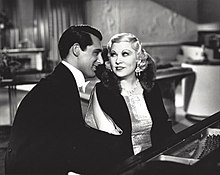|
I'm No Angel
I'm No Angel is a 1933 American pre-Code black comedy film directed by Wesley Ruggles, and starring Mae West and Cary Grant. West received sole story and screenplay credit. It is one of her early films, and, as such, was not subjected to the heavy censorship that dogged her screenplays after Hollywood began enforcing the Hays Code.[4] Plot Tira sings, struts and gyrates in the sideshow of Big Bill Barton's Wonder Show, while her current boyfriend, pickpocket "Slick", relieves her distracted audience of their valuables for Big Bill. One of the rich customers, Ernest Brown, arranges a private rendezvous, during which Slick barges in and attempts to run a badger game on the customer. The customer threatens to call the cops, so Slick whacks him over the head with a bottle. Mistakenly thinking he has killed the man, Slick flees, but is caught and jailed. Fearing that Slick will implicate her, Tira asks Big Bill for a loan to retain her lawyer, Bennie Pinkowitz. He agrees on condition that she does her lion taming act, which includes putting her head into the mouth of one of the beasts, promising her that it will get her (and him) to the "Big Show". It does. (West did some of her own stunts, including riding an elephant into the ring. Tira's fame takes her to New York City, where wealthy Kirk Lawrence is smitten, despite being engaged to snobbish socialite Alicia Hatton. He showers her with expensive gifts. Kirk's friend and even richer cousin, Jack Clayton, goes to see Tira to ask her to leave Kirk and his fiancée alone. He ends up falling for her himself. Tira and Jack’s romance leads to a wedding engagement. Tira tells Big Bill she is quitting to get married. Unwilling to lose his prize act, he has Slick, recently released from prison, sneak into Tira's penthouse suite, where Jack finds him in his robe. As a result, Jack breaks off the engagement. Tira sues Jack for breach of promise. The defense tries to use her past relationships to discredit her, but the judge allows her to cross examine the witnesses herself and in doing so she wins over not only the judge and jury, but also Jack. Jack agrees to give her a big settlement check. When he goes to see her, Tira tears up the check, and the two reconcile. Cast
ContextI'm No Angel was released immediately after She Done Him Wrong, when Mae West was one of the nation's biggest box office attractions and its most controversial star. In the early 1930s, West's films were an important factor in saving Paramount Pictures from bankruptcy.[5] During the difficult times of the Great Depression, many filmgoers responded enthusiastically to West, especially to her portrayal of a woman "from the wrong side of the tracks" achieving success both economically and socially.  Cary Grant starred opposite her for the second and final time; their first film together had been She Done Him Wrong. Grant remained annoyed for decades that West often took credit for his career despite that he had made major films before. The smash hit Blonde Venus, starring Marlene Dietrich and Cary Grant, predates She Done Him Wrong by a year even though Mae West always claimed to have discovered Grant for her film, amusingly elaborating that up until then he had only made "some tests with starlets." She would frequently claim to various reporters through the years that she had spotted him as an unknown walking across a parking lot, asked who he was, and, finding that nobody knew, declared, "If he can talk, I'll use him in my next picture." This tale was routinely incorporated into magazine articles about either West or Grant.[citation needed] West's ribald satire outraged moralists. Film historians cite her as one of the factors for the strict Hollywood production code that soon followed.[citation needed] The Hays Office forced a few changes, including the title of the song "No One Does It Like a Dallas Man", altered to "No One Loves Me Like a Dallas Man".[citation needed] David Niven claims, in an interview on Parkinson, that the Hays Office changed the title from "It Ain't No Sin". ReceptionThe film was Paramount's biggest hit of the year.[6] It was also Franklin D. Roosevelt's favourite film.[citation needed] Signature Mae West lines
Soundtrack
References
Bibliography
External linksWikiquote has quotations related to I'm No Angel. Wikimedia Commons has media related to I'm No Angel.
|
||||||||||||||||||||||||||||||||||
